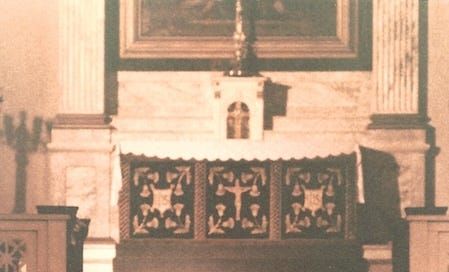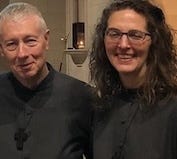In nurturing a healthy parish and building an Apostolic Core, it’s important to start with the organic reality of the place rather than the institutional structure. You begin by noticing and attending to those in the parish who have already been led by the Holy Spirit into a Progressing Faith. People the Spirit has nudged and who have responded. Ideally, at least some of these people are in leadership positions, but often they’re not. Accordingly, you find them where they are; you don’t start by thinking you’re going to convert the vestry.
In this discussion we aren’t offering a comprehensive overview of the task of building an Apostolic Core. Instead, we are focusing on one piece that many clergy get wrong; namely, treating the development of an Apostolic Core as effectively a bureaucratic function that can be accomplished through enough related agenda items and instruction of vestry members. It’s simply the wrong mental model and definitely the wrong place to begin.
Power from the center pervades the whole
In Pastoral Theology: A Reorientation, Martin Thornton presented his understanding of the parish church as the Body of Christ, “the complete Body in microcosm,” and his Remnant Concept, “in which power from the center pervades the whole.” The holiness and love of a Remnant at the center of parish life is for Thornton what makes a parish a true parish.
This dynamic is intrinsic. It is true about the parish church as it now is. It’s not something we need to create or make happen. It is the work of the Spirit in the church. Our task is to see it and cooperate with it. And that involves training and coaching those who are ready to learn, rather than trying to convince and pressure those who are not ready.
The Shape of the Parish model assumes that the Progressing Christians are part of the Sacramental Faith ring. “They are there on Sunday! They are most of the people in any parish. They are regular in their participation because at some level they understand the notion of sacrament. They behaviorally function as though ‘outward and visible’ things such as the Church and the Eucharist can convey inward grace. They may have developed, or be in the process of developing, a sense of their vocation and gifts.” The Progressing Faith person is in “a stage of steady ‘improvement.’ The person becomes more consistent in his or her practices and emotional life. The marks of Apostolic Faith can be seen. This stage may be entered into in a sudden and dramatic movement or may be the end of a slow and long journey.” (Quotes from Fill All Things, Chapter IV.) These people are being drawn forward into Apostolic Faith. They have accepted responsibility for their spiritual life and are responding to the nudging of the Holy Spirit.
If you want to build the parish’s Apostolic center, first, you nurture those who are already of Apostolic Faith and, second, you identify and encourage those who are Progressing or ready to become Progressing. Identifying those folks is about the parish as a whole, not a function of who is currently in leadership.
Understanding the “business” the parish is in
In Light the Dark Streets, Kilmer Myers wrote, “One of the main tasks of the parish priest is to train the militant core of his parishioners in such a way that they understand as fully as possible the true nature of a Christian parish.” Just to reinforce the point we made at the beginning, note that Myers was not saying, “One of the main tasks of the parish priest is to train the vestry in such a way that they understand as fully as possible the true nature of a Christian parish.” Fr. Myers also wrote, “The story of every parish should be a love story”1
This doesn’t mean that clergy and lay leaders don’t share with vestry members “the true nature of a Christian parish.” You can say the words. You can have a vestry use the Purposes of a Parish Church to assess the parish. You can remind vestry members of the strategic importance of focusing on the parish’s primary task. You might even have vestry retreats or leadership conferences that use some of these themes and help to develop understanding and shared language. But all that will not have much weight, until in time, by the organic processes of the Body, the vestry is made up a significant percentage of Apostolic members.
The fact is that all too often vestry members simply don’t understand the “business” we are in. And gaining that understanding isn‘t accomplished in a brief teaching but in years of formation and spiritual practice.
But, but, but – don’t you want the vestry to be Apostolic?
Yes, of course you do. The key is to first think about that as a five-year process of development, not something forced and quick. Nurture Apostolic and Progressing Sacramental Faith generally, and over time, more people of Apostolic Faith are available to join the vestry. And second, make it easy on yourself and the parish by working with the intrinsic dynamics of the parish rather than some scheme you’re trying to force people into.
The core pastoral strategy is to accept people where they are and to invite them to move beyond where they are. And that calls leaders to patience and perseverance.
This abides,
Sister Michelle & Brother Robert
The Feast of George Herbert
--------------------------------------
Resources
Pastoral Theology: A Reorientation, Martin Thornton
Fill All Things: The Spiritual Dynamics of the Parish Church, Chapter 4, Robert A. Gallagher
A Wonderful and Sacred Mystery: A Practical Theology of the Parish Church, Chapter 3, Michelle Heyne & Robert Gallagher
1 From Fr. Myer’s Light the Dark Streets - The story of every parish should be a love story. ...One possible definition for a parish is that it is God's way of meeting the problems of the unloved. This meeting between God and the unloved, the unwanted, takes place in the preaching of the Word, in the Sacraments, in the social life of the parish made possible by the climate of acceptance which is engendered by those who have been baptized and confirmed in the Catholic faith. One of the main tasks of the parish priest is to train the militant core of his parishioners in such a way that they understand as fully as possible the true nature of a Christian parish. -- Kilmer Myers





